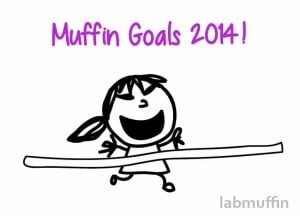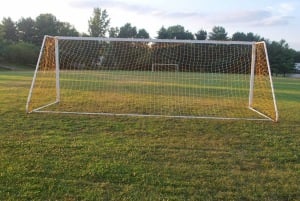Hello, brand spanking new year! It’s that time again: Resolution Time. No doubt you’ve been seeing resolutions flying back and forth everywhere too, possibly along with the discouraging statistic that 88% of all New Year’s resolutions fail. However, people who consciously set resolutions were found to be 10 times more likely to make changes they want in their lives than people who didn’t.
So now that we’ve convinced ourselves to try this resolution-setting thing, what makes a resolution more likely to succeed?
There’s an area of psychological research on this, and the two main factors are that effective goals should be difficult (something that requires significantly more effort than usual), and specific (not vague – “go to the gym three times a week” instead of “get fit”).
This, and some other results from theories of motivation, has been adapted into an acronym SMART: Specific, Measurable, Attainable, Relevant, and Time Framed. (As far as I can tell, there’s no empirical research that directly substantiates this, but it seems like a sensible enough extension.)
You want your goals to be:
Specific: Goals need to be unambiguous – they need to specify what action you have to take (e.g. “go to the gym every week” instead of “get fitter”).
Measurable: It has to be easy to work out if you’ve reached your goal or not, and they can’t be too fudgeable. You need to be able to check if you’re on track (e.g. lose one kilo a month).
Attainable: If a goal doesn’t look achievable, it’s not likely that you’ll be motivated to try very hard. Your goal should be difficult enough that it feels like an accomplishment, but still within your capabilities.
Relevant: You want a goal that seems worthwhile to you, and the direction in which you want your life to head. If you have no real interest in keeping your clothes lint-free, there’s no point in a goal like “Keep all my socks lint-free”, even if it fits all the other criteria!
Time-Framed: Goals usually need to include time frames – “lose 5 kilos” doesn’t have much meaning without a deadline, and it’s very easy to set aside something that doesn’t feel pressing.
All of these are pretty obvious if you think about it, but it’s always nice to know you’re on the right track!
So with all this in mind, I’ve decided to set a few goals in each of my areas of life that need improvement, with specific resolutions to help me get to the goal. Some of these I’ve already started on last year, so including them here is more of a reminder to keep going than a new goal.
Lifestyle goal: Improve my dietary and sleeping habits
As you may know, I am a bit of an eatbeast, and tend to emotionally overeat, with sporadic periods of “clean eating”. I also have terrible sleeping habits, and towards the end of 2013 I was sleeping at 4 in the morning once a week, despite knowing full well the effects of sleep deprivation. Both of these cause me some psychological distress, so reforming these would be
Resolutions
– Limit sessions of junk food gorging to once a week.
– Eat a healthy breakfast (i.e. protein and carbs based, not cheese) at least 5 days a week.
– Go to bed before 1, put down phone before 2; aim to go to bed before 12 and put down phone before 1 by July.
Fitness goal: Get injury-free; get that damn middle split
Last year I suffered a pretty crappy overtraining injury – I have a subacromial impingement in my right shoulder that put me out of pole for most of 2013, right when I was getting into the exciting world of pole competitions. I cried bucketloads of tears when I realised how serious it was, and bucketloads more as all the physiotherapists and osteopaths I went to couldn’t work out what was wrong or help me improve. After hours upon hours of research and expensive discussions with my physio, we worked out what it was, and developed a rehab routine that made me almost symptom free after I stuck to it for two weeks… unfortunately, as it felt better, obviously I had less motivation to keep to it! So one of my goals is to stick to my routine without needing pain as my proverbial “stick”.
I’ve always been very strong but not very flexible, and in 2012 I managed to get one of my first flexibility goals – a flat front split! Last year I managed to get flat front splits on both sides, but this year, I really want that third (and to me, the most useful) split – a straddle split – but I know it’s the most difficult to get without regular stretching, especially since the results aren’t immediately obvious.
Resolutions
– Perform shoulder rehab routine at least every second day.
– Do straddle stretches at least every second day.
Productivity goal: Procrastinate less
I’m a chronic procrastinator, and I often get distracted in the middle of work (hello, endless Wikipedia trail!). I’ve been trying to use productivity tools, and some of them are great, but, um, I forget to use them after a while -_-
My two favourites are:
– The Pomodoro technique, which involves 25 minute sessions of work with 5 minute breaks (and a longer break every few sessions). There are lots of Pomodoro apps and timers available – my favourite is the Simple Pomodoro app on Android.
– To-do lists help a lot with my flagging memory, and I like the sense of accomplishment when I cross things off, but I tend to make lots of lists and forget about half of them.
Resolutions
– Remember to use Pomodoro.
– Check and update to-do list at the beginning of every day; keep them centralised in my new Ardium 2014 planner.
Have you made some resolutions for 2014? Do your new years resolutions fit the SMART criteria?
Further reading
M Tannenbaum, Set SMART goals in 2014!, PsySociety
JC Norcross, MS Mrykalo & MD Blagys, Auld Lang Syne: Success Predictors, Change Processes, and Self-Reported Outcomes of New Year’s Resolvers and Nonresolvers, J Clin Psychol 2002, 58, 397.
E Locke & G Latham, New Directions in Goal-Setting Theory, Curr Dir Psychol Sci, 2006, 15, 265.
SMART criteria (Wikipedia)








You might check out http://www.habitrpg.com for help with keeping tabs on stuff, too — it’s super fun, especially if you like video games.
Oh, that site is awesome! I’ve been itching to play some old school RPGs, I’ll definitely give it a try, thank you!
These are good tips! Thanks for sharing the SMART method.
Pomodoro… Mmm, makes me hungry.
Haha! I love that it translates to food.
2014 will be the year of the splits!! I am working on all of my splits 🙁
I’ve also been thinking a lot about goals and resolutions making lately, so this was a great post to read!
xx
I still need to write my pole move goal list, and maybe start a new pole diary. Best of luck with your splits, don’t pull any hamstrings!
Interesting and useful post!! I downloaded some iPhone/iPad Pomodoro apps (hadn’t heard of it before)… I don’t really “do” resolutions, but this is all great food for thought. 🙂
I’m glad you liked it – I also go on Lifehacker reading sprees, if you’re looking for more inspiration 🙂
I never make new year resolutions. I believe in making changes as I make them up along the way 🙂
I usually do that too, but predictably, I wrote all my resolutions on separate bits of paper and lost track of them, so I think this method works better for me 😉
Great post. I think my goals could stand to be more specific… like you I really should improve my sleeping habits, but if I just say “I need to sleep better” then nothing ever happens, haha. I’ll try thinking about it in more concrete terms!
Yes, specific goals definitely helps! So much easier to stick to 🙂
ur new year resolutions are really good… i like the sound of that app. im sooo bad with procrastination. i’ll leave something and find a million other things to do before it actually NEEDS doing xxx
Haha yes! I always avoid the hell out of the top thing on my to-do list -_-